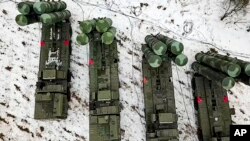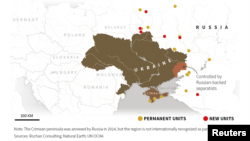Britain on Thursday urged Russia to take a “diplomatic route that avoids conflict and bloodshed” while warning against any Russian moves that undermine Ukraine’s sovereignty.
“Fundamentally, a war in Ukraine would be disastrous for the Russian and Ukrainian people and for European security and together NATO has made it clear that any incursion into Ukraine would have massive consequences and carry severe costs,” British Foreign Secretary Liz Truss said as she met with Russian Foreign Minister Sergey Lavrov.
Western governments have been calling on Russia to take steps to de-escalate the crisis that has come with it massing more than 100,000 troops near the border, deploying warships to the Black Sea and sending more troops and military equipment to Belarus, another Ukrainian neighbor, for military drills that began Thursday.
Ukraine also launched its own military drills Thursday with both set to last until Feb. 20.
Lavrov said Thursday that only “mutually respectful dialogue” can lead to normalized relations.
“Ideological approaches, ultimatums, threats -- this is the road to nowhere,” Lavrov said.
British Prime Minister Boris Johnson traveled Thursday to Brussels to discuss the crisis with NATO Secretary General Jens Stoltenberg before heading for more meetings with leaders in Poland.
Johnson called the situation the “biggest security crisis that Europe has faced for decades” as he urged solidarity with NATO allies. He told reporters he does not think that Russian President Vladimir Putin has yet made a decision about whether to invade Ukraine, but added, “our intelligence remains grim.”
Stoltenberg told reporters he sent a letter to Lavrov inviting Russia for more rounds of meeting to “find a diplomatic way forward.”
"We are prepared to listen to Russia's concerns and ready to discuss ways to uphold and strengthen the fundamental principles of European security that we all have signed up to,” Stoltenberg said.
Putin has denied he plans to invade Ukraine but demanded that the West reject the possibility of Ukraine joining the 30 countries already in NATO and that the Western allies pull back their troops and armaments closest to Russia.
Stoltenberg reiterated the position that Russia has no veto power over who belongs to NATO, but that the alliance is willing to discuss certain security issues such as military drills and arms control.
He added, “Renewed Russian aggression will lead to more NATO presence, not less.”
White House press secretary Jen Psaki told reporters Wednesday Russia has been taking escalatory steps in recent weeks and the United States hopes that changes.
“I think as we look at the preparation for these military exercises, again, we see this as certainly more of an escalatory and not a de-escalatory action as it relates to those troops and the military exercises,” Psaki said.
Top Russian commanders arrived in Belarus on Wednesday, set to oversee 30,000 Russian troops as they train with the Belarusian military.
Russia has moved S-400 surface-to-air missile systems and numerous fighter jets into Belarus for the exercises, with Gen. Valery Gerasimov, the chief of the Russian armed forces’ general staff, in command of the drills.
The training in Belarus is the latest threat to Ukraine, whose capital, Kyiv, is 210 kilometers to the south.
Ukraine’s military exercises involve unmanned aircraft and antitank missiles supplied by Ukraine’s Western allies.
Kremlin spokesman Dmitry Peskov said Russia was staging the joint exercises with Belarus to combat “unprecedented security threats.”
Western intelligence experts say they believe Moscow has about 70% of its strike force in place for an attack on its one-time Soviet republic, which that has leaned to the West in recent years and seeks to join NATO.
Russian President Vladimir Putin has denied he plans to invade Ukraine but demanded that the West reject the possibility of Ukraine joining the 30 countries already in NATO and that the Western allies pull back their troops and armaments closest to Russia.
In response, the West has said Russia has no veto power over who belongs to NATO but that it is willing to negotiate with Moscow over the placement of missiles in eastern Europe and periodic NATO military drills.
Some information for this report came from The Associated Press, Agence France-Presse and Reuters.







